Will A Mother Mouse Come Back For Babies?
This page contains affiliate links. We may earn money or products from the companies mentioned in this post through our independently chosen links, which earn us a commission. Learn More
Wildlife is meant to stay in the wild, but that doesn’t mean mother nature doesn’t need a little help from time to time. If you’ve come across a nest of baby mice, you may be wondering what to do.
Will the mother mouse come back or are the babies left to fend for themselves?
Here’s what you need to know about newborn mice and what to do if you find a nest.
Why Would A Mother Mouse Abandon Her Litter?
No mother ever wants to abandon her young, but things happen. If a mother mouse abandons her litter, there are several potential reasons:
- The mother mouse is dead or dying
- The litter is too large and needs to be separated for survival
- The mother didn’t bond with her pups
- The mother has left to find food or rest
The first, and perhaps most obvious, reason is that the female mouse herself has died or is dying. When a mother mouse knows her time is near, she may separate herself from the litter, so her body won’t attract wild animals to the litter.
The pups may or may not survive on their own, depending how old there are, but she wants to give them the best possible chance at life without her.
In some cases, a mother mouse simply doesn’t bond with her pups. In cases like this, a female mouse may simply see the pups as an inconvenience and may leave them behind.
It may also simply be that she needs a break to look for food or get some rest. In that case, she may come back.
Can Baby Mice Survive On Their Own?
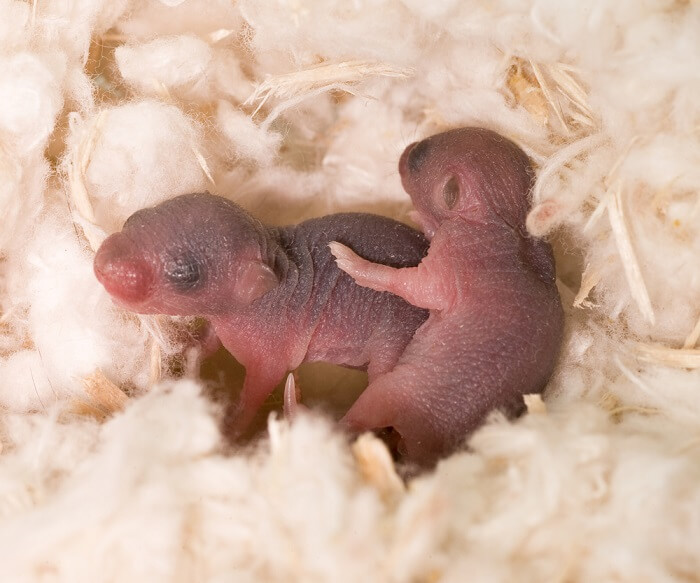
Whether baby mice can survive on their own really depends on old they are. Newborn mice are often called “pinkies” because they have virtually no fur and they are entirely dependent on their mother for warmth and food.
Newborn mice can’t even open their eyes and their muscles haven’t properly formed yet to enable them to go looking for food.
Baby mice subsist on their mother’s milk for about a month before they are strong enough to leave the nest. More than that, the mother mouse also teaches them how to urinate.
The pups are unlikely to survive unless they are at least 3 weeks old when they become orphaned. The third week is when they open their eyes and can start to accept solid food. Their fur won’t grow in until the 5th or 6th week.
What To Do If You Find Baby Mice?
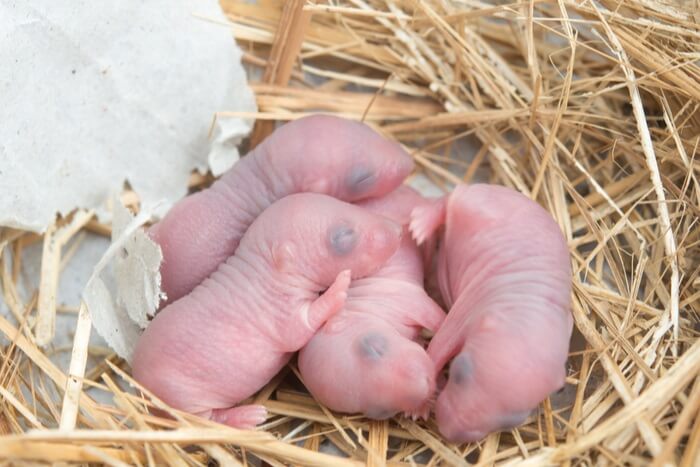
If you come across a nest of baby mice, you shouldn’t immediately assume they’ve been orphaned. Wild mice need to feed themselves in order to take care of their young, so it’s natural for the mother to spend some time away from the nest.
Keep an eye on the nest from a distance and watch to see if the mother returns. If you can’t stay nearby, come back after 4 to 6 hours and check.
It’s important to handle the baby mice as little as possible, but the mother won’t abandon her pups just because they have the scent of human on them.
Gently turn over or pick up one of the pups and check its belly – if you don’t see white bands it means they have not been fed. At this point, it is fairly safe to assume that the mother is dead or the nest has been abandoned.
Once you’ve determined that the nest has been abandoned, the best thing to do is contact your local wildlife rehabilitation office. Transferring the baby mice into the hands of a professional gives them their best chance for survival and release back into the wild.
If that’s not an option, you may need to hand-feed the babies yourself until they are old enough to fend for themselves.
Tips For Hand-Feeding Baby Mice
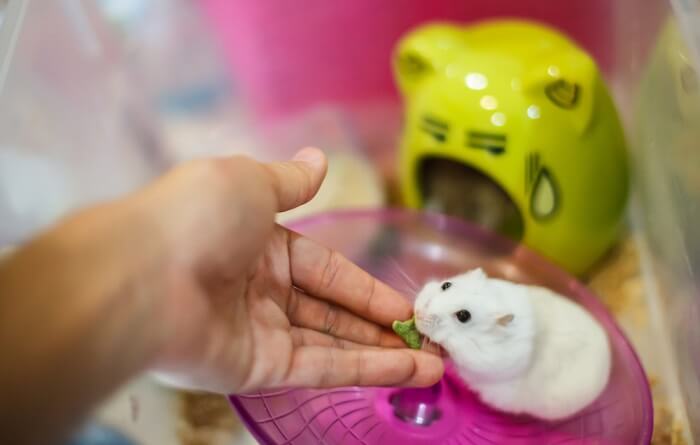
The first thing you need to do when you take over care of a nest of baby mice is keep them warm and keep them fed. The best place to keep them is in a small box lined with some kind of soft nesting material – old t-shirts, stuffed animals, and blankets work well.
Here are some other materials you may need:
- Pedialyte
- A small syringe
- A heating pad
- Puppy milk replacement
- Q-tips
Once you’ve assembled the nest, inspect all the baby mice for signs of injury before settling them in to warm up while you get their food ready. The closest thing you’ll find to mouse milk is puppy milk replacement. Depending how old the pups are, you may need to feed them 5 times a day or more.
Here’s a quick chart to help you figure it out:
| Age | Feeds Per Day | Frequency of Feeding |
| <1 week | 7 to 8 | Every 1-2 hours, plus once overnight |
| 1 to 2 weeks | 5 to 6 | Every 3-4 hours, plus once overnight |
| 2 to 3 weeks | 3 to 4 | Every 4-5 hours |
| 4 to 5 weeks | 2 to 3 | Introduce crushed food blocks for mice |
| 6 to 7 weeks | 1 | Crushed mice food blocks, start introducing other food |
Before feeding the baby mice for the first time, you may need to rehydrate them. Use a small syringe (you can generally find them at the pet store) to administer 3 to 4 drops of unflavored Pedialyte then wait an hour before trying to feed the mice.
To feed the baby mice, fill a small syringe or eye dropper with the puppy milk replacement and try to feed the mice directly.
Be careful not to press too hard on the syringe or the pup will aspirate, and you’ll see milk coming from its nose. Make sure the pup is positioned upright with its belly down for feedings and go slow. You may need to dilute the milk replacement with water for the first few feedings.
A wild baby mouse needs about 0.05cc of formula per gram of its own body weight at each feeding. For example, a baby mouse that weighs 10 grams should take 0.5cc of milk at each feeding. If the mouse is too small to feed from a syringe, you can try dipping a fine-tip paintbrush into the formula and dab it at the corner of the baby’s mouse to get it to feed.
After each feeding, you’ll need to stimulate the baby mice to urinate and defecate because they are not able to go on their own yet. Use a Q-tip soaked in warm water to gently rub the mouse’s belly and anus until it relieves itself.
If it doesn’t work the first time, try again after 30 minutes. It is natural for the droppings to be mustard yellow in color rather than dark brown, so don’t worry.
How To Wean Older Baby Mice?
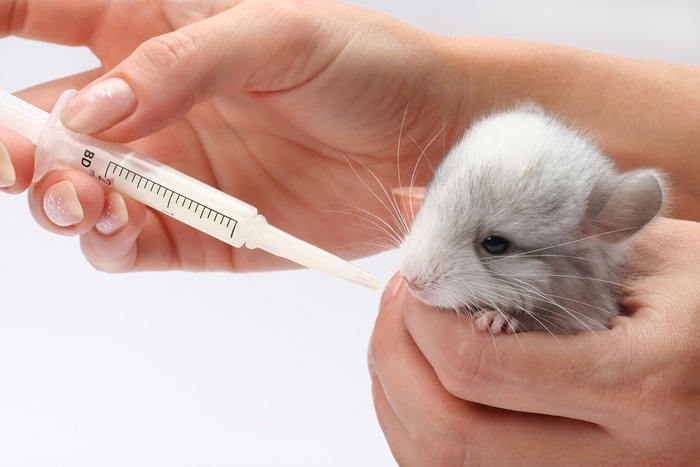
As the baby mice grow, you’ll need to start thinking about weaning them onto solid food. Once the babies open their eyes, you should be able to add some solid food on top of the formula. Start with premixed pet food for rodents – mouse food or hamster food should work.
You’ll also need to hang a water bottle for older mice who are able to drink on their own. Avoid using water bowls, however, because the baby mice could easily drown.
The more the baby mice grow and mature, the more space they will need. A cage designed for small animals should work well, as long as the bars aren’t spaced wide enough that the mice can get through. Provide toilet paper tubes for chewing and play and add an exercise wheel when the mice are big enough to use it safely.
Eventually, you’ll need to decide whether you’re going to care for the mice for the duration of their lives or if you’re going to release the little critters into the wild. There’s some risk with releasing the mice into the wild since they haven’t learned the ropes from their mother, but it may be the best option.
Frequently Asked Questions
How many babies do wild mice have?
A female mouse typically gives birth to 5 or 6 pups, but a large litter could contain more than a dozen babies.
How long is the gestation period for mice?
The gestation period for mice is very short, only about 19 to 21 days. Female mice can have as many as 10 litters per year which is how a single male and female house mouse can quickly turn into an infestation.
What is the lifespan for a house mouse?
A wild mouse generally only lives for 12 to 18 months. Pet mice, on the other hand, can live for several years.

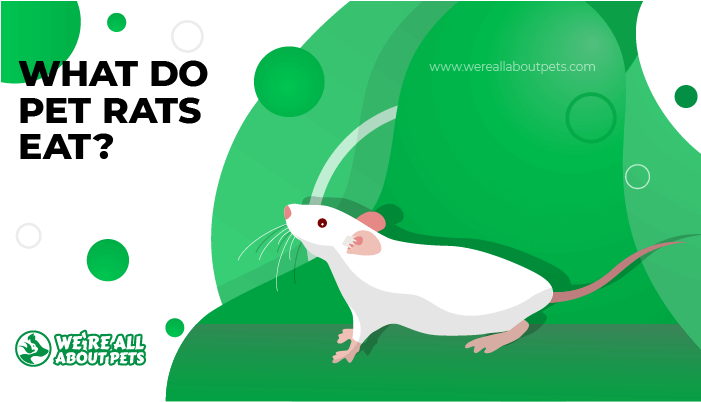

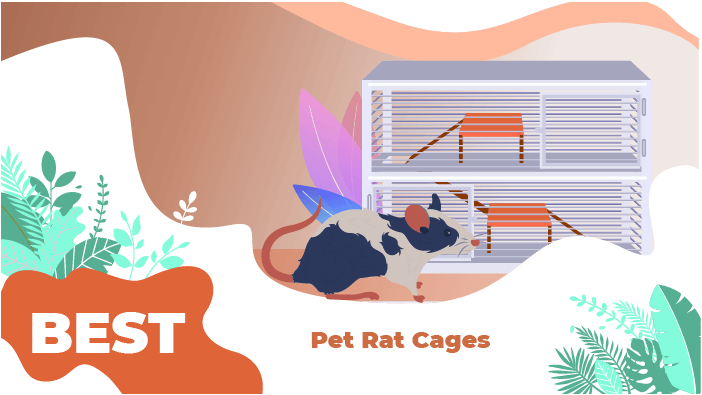
Cassie
I have mice in the house, & I need to get them out - alive, of course. But I am afraid there might be babies that will get left behind. I don't know what to do! I wouldn't even bother, except they are being destructive, & we don't even want to open drawers anymore, especially in the kitchen.
Mallory Crusta
Hi Cassie, that's a good question. There are humane traps that will allow you to safely get the mice out of the house, but you're right that any baby mice in nests will not be removed using this method. I would recommend contacting a local pest control company and asking for advice specific to your situation.
Cassie Meigs
Okay, thank you
Sharon Ellis
I saw a baby mouse (3 wks perhaps) in my yard. It was alive but didn't move. I went into the house to get suggestions. When I came back out, it looked dead and had a red line as if, perhaps, a bird had injured it by pecking it. This evening, the mice is gone. How do you think it disappeared? Thank you.
Kate Barrington
Hi Sharon, unfortunately it sounds like some kind of predator probably carried it off. Maybe a bird or a cat.
SLM
Hi - I have found a mouse and her nest in our bbq. Went to move it: *newborns*! Mom is a good Mom...she didn't leave until absolute last moment. I had gloves on so nest/babies didn't have my scent. I put them back; closed bbq. Watch from afar: Mom came back! Good! But.....now what?? I don't want to keep checking, so as not to scare her off. But also want to get her out of there and clean bbq once babies are gone/before she has MORE!! I found them Oct 20, only days old....very pink, no fur, eyes closed. HOW LONG until I can check again and ensure babies left nest...so I can remove the nest, and possibly live-trap and remove the Mom to relocate? And then how to keep out of bbq? I tried mint leaves but now maybe aluminum foil? We don;t use bbq often but I have been checking it but she seems to love our bb and makes a nest regularly and quickly! - Thanks for any hints and tips.
Beth
Hi! I have found what looks to be a 3/4 week baby brown mouse just inside my front door. I have also found adult droppings but only once. What should I do?!?! Any help is greatly appreciated! I have it warm and comfortable and no I juries but is rather fast
Tess
Hi. Help Please! I found a nest of baby mice in my linen press. I set a humane trap to catch mum and then gathered up the babies. There were five older ones and five newborns. Put mum in with them with food and water. I was waiting a couple of days until the weather turned good before releasing the family out in my gardening shed. But Mum channelled Houdini and escaped. I have been caring for the babies since with a very expensive pet formula from the vets. The older ones are doing alright but the smaller babies are suffering. I have just recaught the Mum after 4-5 days. Is it alright to put her in with the babies or will she kill them?I have been using latex gloves.
Kate Barrington
Hi Tess! It sounds like you're doing your very best to take care of everyone, unfortunately it's difficult to predict how the mother might react after an absence. It's not uncommon for mice to kill some of their babies shortly after birth, but if some time has passed it may be okay. Since you've been using gloves, you may not have transferred your scent which, in some cases, confuses a mother mouse. That being said, stress could be a concern in this case. The mother might neglect the babies at best, or kill them at worst. I'm sorry I can't give you any specific advice, but it might be worth trying a reintroduction. If it works out, it's probably what's best for the babies. Good luck!